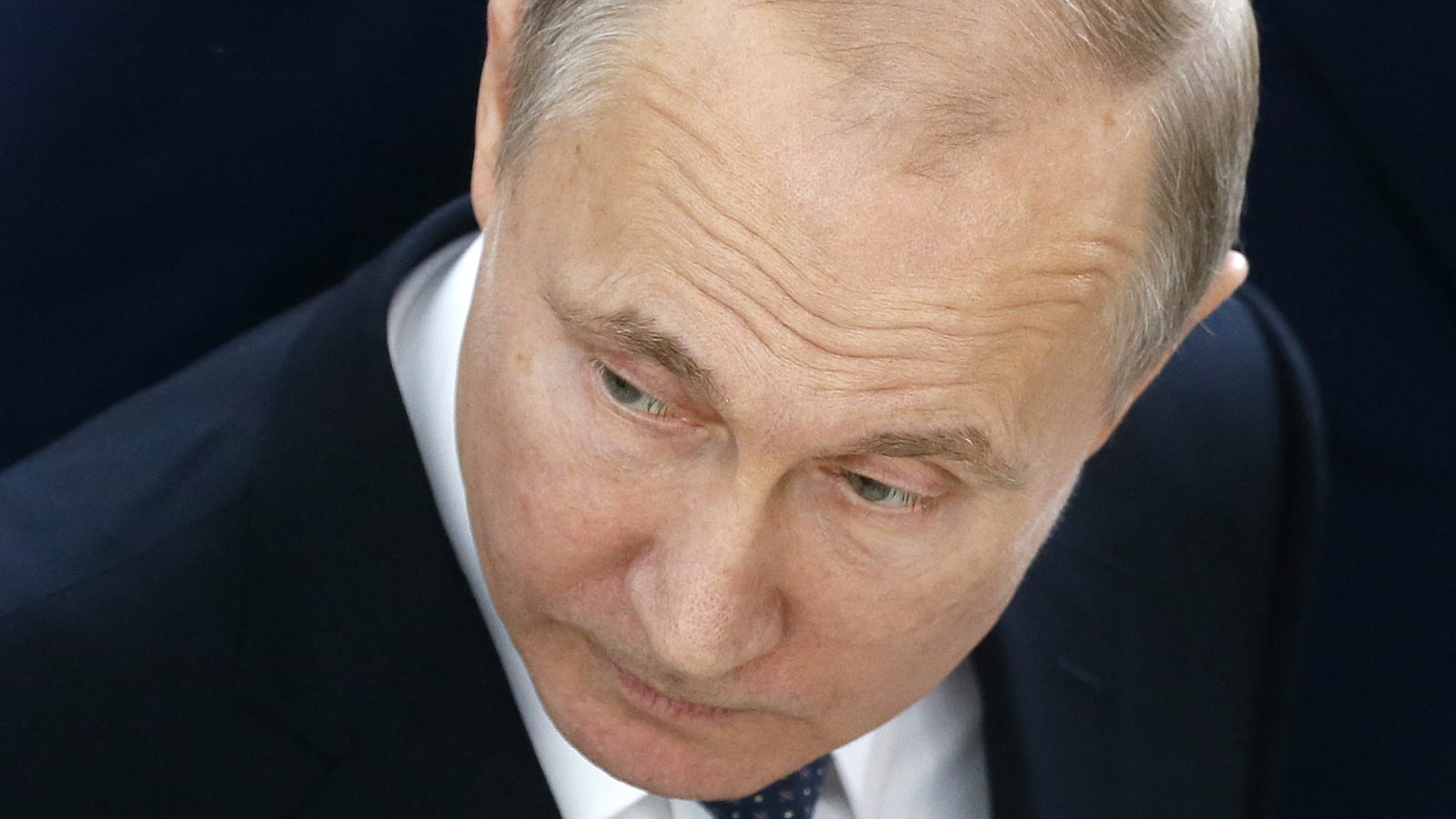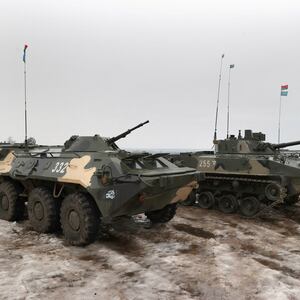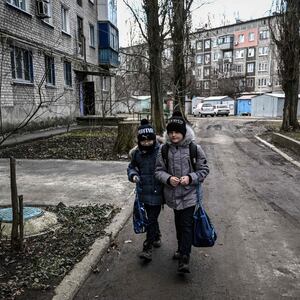As Russian President Vladimir Putin painstakingly built up momentum for his recognition of the self-proclaimed “republics” in eastern Ukraine, Russian state media and loose-lipped lawmakers signaled his plans in advance.
Putin’s bold-faced demand for “security guarantees'” caught the West off-guard, but the pro-Kremlin mouthpieces were bursting with pride about the leader’s “genius” plan. They spilled the beans on state television and even in Russian parliament, boasting about how Putin had intentionally asked for the impossible, only to turn around and use NATO’s refusal as an excuse to re-invade Ukraine on a larger scale.
In addition to blaming NATO for allegedly threatening Russia with its expansion, Russian state media and the cadre of covert operators in eastern Ukraine worked to ratchet up the tensions. The simmering conflict was set ablaze with a series of alleged attacks against civilians, unexplained explosions and even alleged attempts to shell and penetrate the Russian border. Eliot Higgins, founder of the open-source investigation team Bellingcat, along with his team, quickly debunked Russia’s multiple false-flag videos as sloppy fabrications. Higgins tweeted: “These are genuinely some of the most idiotic efforts at disinformation I've seen. I expected to be lied to, but I didn't expect all those lies to be so blatantly dumb. I'm actually offended at the poor quality of this propaganda...”
The Kremlin’s plans were dampened not only by the Biden administration’s decision to release key findings of U.S. intelligence agencies. Russian lawmakers and state TV personalities also laid bare the Kremlin’s intent to attack Ukraine, a plan they imply was hatched long before the recent false-flag operations were set into motion.
During a recorded speech at the State Duma on Dec. 2021, Vladimir Zhirinovsky, the ultranationalist leader of Russia’s Liberal Democratic Party, discussed Putin’s sham proposal to NATO. Zhirinovsky told fellow parliamentarians: “I liked one phrase from what the President said yesterday... he said that we won’t allow our proposal to result only in futile discussions... They either fulfill it, or we’re moving forward with another option... Let it be February 22, 2022 at 4 a.m.” Zhirinovsky added: “The year 2022 is the year of the tiger. It’s a breakthrough, a jump by the Russian tiger…This won’t be a peaceful year, but a year when Russia will become great again and everyone will have to shut up and respect our country.”
That wasn’t the first time Zhirinovsky had made predictions about the current chaos unfolding in Ukraine. Back in 2018, in an appearance on state TV show 60 Minutes, Zhirinovsky said: “We don’t need a part of Ukraine, we’re waiting for it to be primed to take the whole thing. We’ll be taking all of Ukraine in its entirety.” The audience clapped. Zhirinovsky continued: “Americans [the Trump administration] are ready to accept that Russia will get the southern and eastern regions of Ukraine. But if they get to keep the western parts, they’ll be mounting provocations out of there. All of Ukraine will go to Russia. But only when the situation is ripe.”
Putin signed a decree ordering troop deployments to eastern Ukraine after announcing his decision to recognize the independence of Ukraine’s two breakaway regions on Feb. 21. A day later, Russia's lower house of parliament, the State Duma, unanimously voted to approve friendship treaties with the territories. State TV propagandist Vladimir Soloviev described Zhirinovsky as a “prophet,” as he replayed his State Duma predictions on his show Soloviev Live, during a segment entitled “Russian troops enter Donbas... The new world order.”
But Zhirinovsky’s blabbing was hardly a prophecy. It seemed to be part of the plan, known and understood by many in Putin’s circle.
Earlier this year, Russian military expert Igor Korotchenko asked on another state TV segment: “Why did we need these talks? I believe, for only one reason: legitimizing Russia’s further military and military-technical activities,” he said, answering his own question. “We knew in advance how these talks would end… we said, it’s time for a new reality, when diplomacy is powerless. It’s time for militarily coercive diplomacy on the part of Russia. We will hit carefully, but hard. In this sense, Russia’s hands should be—and will be—untied for any actions.”
Host Olga Skabeeva responded by saying Putin already made his decision and the talks with Americans and NATO “merely a formality, just to show we tried everything.” She went on: “We’re talking to them so brashly, it’s clear that we’ve already decided what to do and how to behave.” Quoting Putin’s infamous expression, Korotchenko added: “If a fight is inevitable, you must strike first.” He predicted that Russia’s recognition of the self-proclaimed republics in eastern Ukraine would immediately lead to the official integration of their military forces with those of Russia.
On the same day, RT’s head Margarita Simonyan tweeted that the Kremlin’s proposals to “NATO enemies” were never meant to be accepted.
These “prophecies” about the Ukraine crisis on Russian state television go even further back. In November of last year, Kremlin lawmaker Aleksei Zhuravlyov proclaimed: “Ukraine is a problem that I believe will be solved in the near future.” When host Olga Skabeeva said she didn’t understand what the lawmaker was implying, he cryptically responded: “You will understand, and soon. I’m sure of that.”
Skabeeva quickly caught on: “The conclusion: Russia has a very secret—and a very smart—plan,” she said. Pointing at the Ukrainian panelist in the studio, she sniped: “Stand there and be very afraid.”
Fast forward to Feb. 22, as Russian troops were moving into Ukraine’s breakaway states, Zhuravlyov was on state TV with some confident ideas about how the next phase of the Russian invasion would play out. Upon entering eastern Ukraine, Russian troops will take the rest of the country “the moment there is a provocation” by the Ukrainian military, Zhuravlyov said. He ominously promised: “And there will be a provocation. I guarantee it.”








